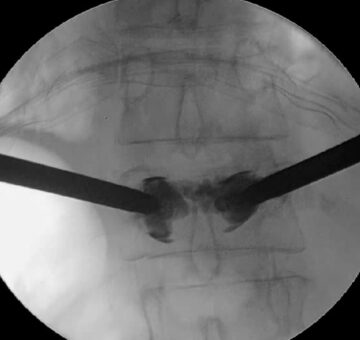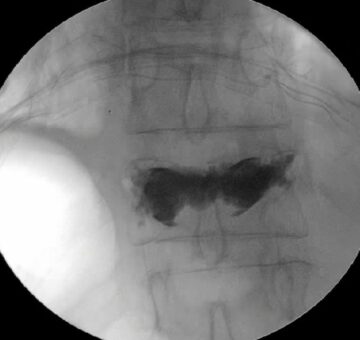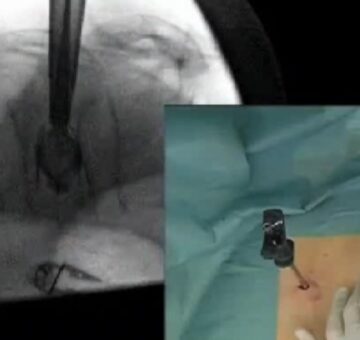Contact the coordinator
+48 75 645 2013
Vertebroplasty
The team of the Lower Silesian Center for Minimally Invasive Spine Neurosurgery KCM Clinic in Jelenia Góra specializes in minimally invasive and endoscopic surgical treatment of cervical, lumbar and thoracic spine diseases. A rupture or fracture in the spinal cord may be caused by osteoporosis or an injury to the spine. The disease causes a lot of back pain in patients, which requires intervention. One of the minimally invasive methods of treatment is vertebroplasty of the vertebral body.
What is vertebroplasty?
Vertebroplasty is a procedure where a special cement is injected into a damaged or broken vertebral bone to alleviate pain. This treatment is frequently utilized to treat compression fractures, which are a type of injury caused by the weakening of bones due to osteoporosis, a condition that is prevalent in older individuals. While not all compression fractures cause discomfort and don’t require treatment, if one experiences ongoing or severe pain, vertebroplasty might be a solution.
What is the purpose of the procedure?
Vertebroplasty is a procedure that aims to relieve pain caused by compression fractures in the spine. These fractures often occur when the spinal bones are weakened by conditions like osteoporosis or cancer, leading to cracks or breaks that can cause persistent pain. The procedure involves injecting a special cement into the affected vertebral bone to help stabilize it and provide pain relief.
What can be expected during the procedure?
For the procedure, you will need to wear a hospital gown and have a thin, flexible tube inserted into a vein in your arm or hand. The type of anesthesia used will depend on the specifics of the procedure and the number of spinal bones being treated. General anesthesia is an option for putting you in a sleep-like state during the procedure, but in most cases, sedation with drugs to make you relaxed and sleepy is sufficient.
You will lie facedown and receive local anesthetic injections to numb the skin. The procedure usually lasts about an hour, although it may take longer if more than one spinal bone requires treatment. Special imaging techniques such as X-rays or CT scans are used to guide the needle into the correct position, and the cement hardens in 20 minutes. If the fracture was caused by cancer, a small sample of bone tissue may be taken for testing and radiation therapy may be administered before or after the procedure.
What can be expected after the procedure?
For the majority of individuals who undergo vertebroplasty or kyphoplasty, the procedure is completed on an outpatient basis and they are able to return home the same day. It is important to arrange for someone else to drive you home.
The injection site on your back where the needles were inserted may experience some discomfort for a few days, which can be relieved through the use of an ice pack, although it is important to protect your skin from direct contact with the ice by covering it with a cloth. It is recommended to use ice for 15 minutes every hour.
It is also advised to avoid heavy lifting for at least 6 weeks post-procedure.
Janz Helmut - Canada
This was an exceptional experience
This was an exceptional experience. We found this clinic via internet and are from Canada. We called the clinic just three weeks ago to get spine surgery. So quickly a sweet gal named Carolyn booked us in for surgery. We received all the information and she spoke perfect English. We booked our flights and once we arrived we were picked up by our driver they arranged. The next day.... Read more
gary joyce - United Kingdom
Spinal surgery
So in terms of price comparison to UK 70% cheaper . And you have to factor that in. So in comparison to say Harley street it's not Harley Street but for the price it's above it. My operation was to have diam stabilisation l5/S1 and discetomy l4/l5 using radio frequency to destroy annular tear. 2 weeks after operation my posture has completely changed due to implant...Read more
Vertebroplasty is a minimally invasive procedure that is performed in the event of a rupture or fracture of the vertebral body accompanied by pain. The most common indication is osteoporosis. The procedure involves injecting a cement glue through a special needle into a broken or squashed vertebral body. This stiffens the damaged vertebral body and stabilizes the pain-provoking elements moving in relation to each other.



Before surgery, it is necessary to have a consultation with a neurosurgeon performing the procedure – dr hab. Stanisław Kwiek. To qualify for the procedure, a current MRI or CT scan result is required – the result cannot be older than 6 months. The test results should be with you during the consultation on the CD – the test description alone is not sufficient.
Magnetic resonance imaging or computed tomography is also available as a private service at OMEGA diagnostic imaging, which receives patients in the same building as KCM Clinic.
The patient must perform tests in accordance with the recommendations of the neurosurgeon after medical consultation prior to the procedure. Anesthesiological consultation, performed on the day of admission to the hospital ward, is also necessary. Prepare for a two-day stay in the hospital ward at KCM Clinic. Before the procedure, the patient reports to the Registration with full documentation and the results of imaging and laboratory tests.
It should also be remembered that patients after surgery cannot drive a car. The patient should take care of an accompanying person who will help ensure a safe return home.
Specialised physiotherapy and rehabilitation are very important after neurosurgery. It is absolutely necessary to follow the instructions of the doctor and medical staff. Correct physiotherapy is managed by Krzysztof Suszyński, MD, physiotherapy specialist, both before and after our minimally invasive endoscopic procedures.
Persons struggling with comorbidities or other health problems must inform their physician during the first qualification consultation. Before the procedure, all tests should be carried out as prescribed by the doctor and all recommendations before and after the procedure should be followed.
- About the procedure
-
Vertebroplasty is a minimally invasive procedure that is performed in the event of a rupture or fracture of the vertebral body accompanied by pain. The most common indication is osteoporosis. The procedure involves injecting a cement glue through a special needle into a broken or squashed vertebral body. This stiffens the damaged vertebral body and stabilizes the pain-provoking elements moving in relation to each other.



- Preparation
-
Before surgery, it is necessary to have a consultation with a neurosurgeon performing the procedure – dr hab. Stanisław Kwiek. To qualify for the procedure, a current MRI or CT scan result is required – the result cannot be older than 6 months. The test results should be with you during the consultation on the CD – the test description alone is not sufficient.
Magnetic resonance imaging or computed tomography is also available as a private service at OMEGA diagnostic imaging, which receives patients in the same building as KCM Clinic.
The patient must perform tests in accordance with the recommendations of the neurosurgeon after medical consultation prior to the procedure. Anesthesiological consultation, performed on the day of admission to the hospital ward, is also necessary. Prepare for a two-day stay in the hospital ward at KCM Clinic. Before the procedure, the patient reports to the Registration with full documentation and the results of imaging and laboratory tests.
It should also be remembered that patients after surgery cannot drive a car. The patient should take care of an accompanying person who will help ensure a safe return home.
- Convalescence
-
Specialised physiotherapy and rehabilitation are very important after neurosurgery. It is absolutely necessary to follow the instructions of the doctor and medical staff. Correct physiotherapy is managed by Krzysztof Suszyński, MD, physiotherapy specialist, both before and after our minimally invasive endoscopic procedures.
- Precautions
-
Persons struggling with comorbidities or other health problems must inform their physician during the first qualification consultation. Before the procedure, all tests should be carried out as prescribed by the doctor and all recommendations before and after the procedure should be followed.
Send Request
Register
Visits, hospital procedures
Bariatric Surgery Center
Plastic Surgery Center
Spine Surgery Center
Dental Clinic
OMEGA Imaging Diagnostic Center
Work hours
KCM Clinic Wrocław
Chat KCM Clinic
Locations
KCM Clinic Jelenia Góra
KCM Clinic Wrocław
Parking

